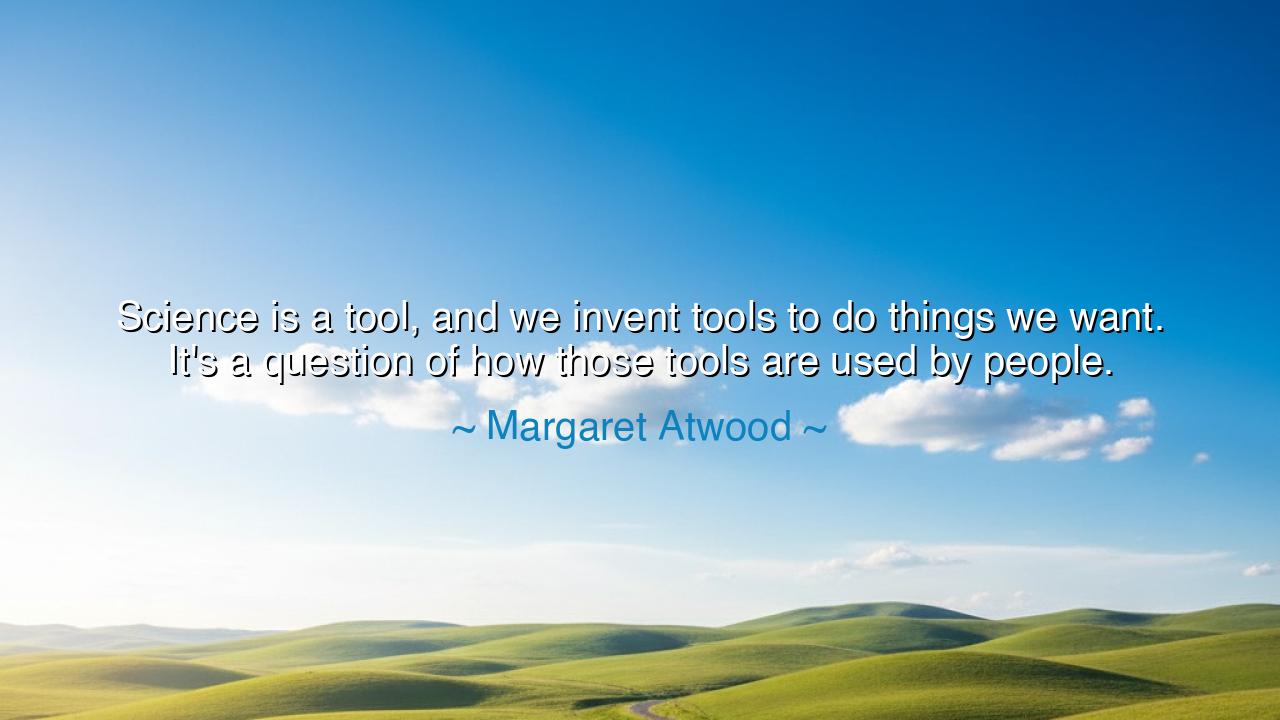
Science is a tool, and we invent tools to do things we want. It's
Science is a tool, and we invent tools to do things we want. It's a question of how those tools are used by people.






"Science is a tool, and we invent tools to do things we want. It's a question of how those tools are used by people." These words, spoken by the profound Margaret Atwood, cut to the heart of the eternal struggle between human intention and the power of the instruments we create. Like a hammer in the hands of a craftsman, science is neither good nor evil by itself. It is merely a tool, a means to an end, shaped and directed by the hands of humanity. The true power of science lies not in its discovery or invention, but in the purpose to which it is applied. This is the ancient wisdom passed down through the ages—that all things, when placed in human hands, carry the potential for both creation and destruction.
From the dawn of time, we have invented tools to shape our world. The wheel, a simple yet revolutionary invention, was forged not to cause harm but to ease the burden of human labor. The early toolmakers of our ancestors, guided by a deep understanding of necessity, shaped their tools with the purpose of improving life. Yet, as the wheel spun onward through the corridors of time, so too did the use of tools evolve. Science, that greatest of tools, holds within it the power to heal or to harm, to uplift or to destroy, depending on the intentions of those who wield it.
Consider the invention of fire, that primal force which has served humanity for millennia. Fire gave warmth, cooked food, illuminated the darkness, and forged metals into weapons of great power. In the hands of the wise, fire was a servant, a protector of life. But when placed in the hands of the unwise, fire could ravage cities and destroy civilizations. This same principle applies to all the tools that science has placed into our hands. The atomic bomb, that fearsome fruit of nuclear science, has the potential to bring about unparalleled destruction. Yet, the very same principles of atomic energy can be used to power homes, treat illnesses, and advance knowledge. The difference lies not in the tool itself, but in how it is used.
Throughout history, we find examples of tools—whether physical or intellectual—used both for noble and nefarious purposes. The printing press, which birthed the Renaissance and spread knowledge across the globe, was a tool for enlightenment. But the same press, in the hands of tyrants, could spread propaganda and incite fear. The internet, that wondrous invention of the modern age, has become a double-edged sword, capable of uniting humanity and yet also of spreading discord and misinformation. In every case, the question is the same: what is the intent behind the use of the tool? Will it serve the greater good, or will it be used to further selfish desires?
This brings us to the lesson we must learn from Margaret Atwood’s words. Science, in its purest form, is a reflection of the human spirit. It holds within it the potential for immense good or evil, depending on the hands that shape its use. Just as the wise artisan must choose with great care the purpose to which his tools are put, so too must we, as stewards of scientific knowledge, use our tools wisely. Innovation without moral consideration can lead to untold harm, but science guided by wisdom, compassion, and integrity can elevate humanity to heights undreamt of.
In our own lives, let us take a lesson from the past and strive to use the tools of today with the same intention that the ancients used their first simple implements. Let us ask ourselves: How can the tools we have—the tools of knowledge, technology, and science—serve the greater good? What kind of future are we building with the tools we wield today? Will we create a world where these tools are used to heal, to unite, and to advance all of humanity? Or will we, blinded by ambition or greed, allow them to be used for destruction?
As we walk the path ahead, let us be ever mindful that science is a tool—a tool that can be used to carve a better future, but only if guided by the wise hands of those who understand the deep responsibility that comes with it. The power of science lies not in its ability to transform the world, but in the choices we make about how to use it. Let us choose wisely, and may our tools serve to build a world worthy of the wisdom passed down from those who came before us.






AAdministratorAdministrator
Welcome, honored guests. Please leave a comment, we will respond soon